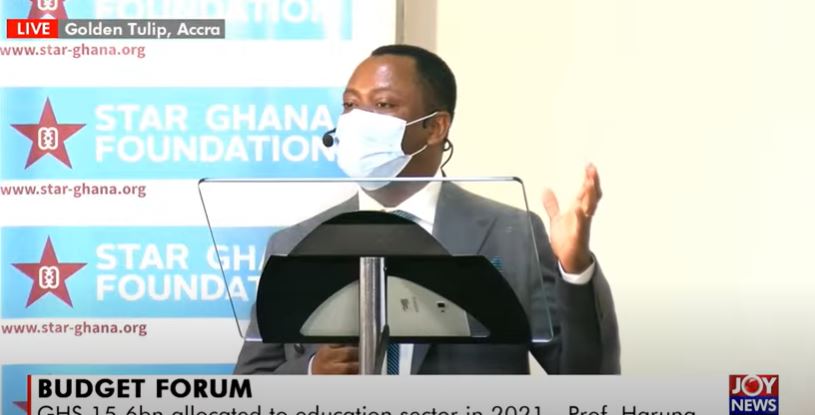A Senior Lecturer at the University of Development Studies, Dr. Haruna Issahaku has said that the 2022 budget statement disadvantageously targets the Akufo-Addo-led administration’s Free SHS flagship programme at the expense of basic education in the country.
According to him, the government has shifted attention from basic education development and that is responsible for the lack of textbooks for the new curriculum introduced two years ago.
He noted that, once again, the issue of textbooks has not been given special mention in the 2022 Budget proving his assertion of the government's shifted attention from basic education.
Speaking at the Star Ghana Foundation Budget Forum on Education and Health, Dr. Haruna Issahaku noted that the neglect of basic education is just one of the many issues the country's education sector is grappling with.
He added that Ghana has failed to meet UNESCO’s minimum threshold for the allocation of public expenditure to education in order to improve the quality of education in the country.
Dr. Issahaku said, “Member states of UNESCO agreed that they’ll spend between 4-6%of their GDP, or alternatively, 15 to 20% of public expenditure on education in order to improve education.
“Given this benchmark, we can now look at the allocations to the education sector between 2021 and then 2022 so that we can see whether Ghana is on course on meeting this threshold of 4% of GDP expenditure on education.
“In 2021, the amount allocated to the education sector was 15.6 billion Ghana cedis. This increased by 14% to settle at 17.8% in the 2022 budget. So the change is about 2.2million Ghana cedis.”
He added that as of 2021, the government’s allocation to education stood at 3.6% of the country’s GDP, and 2022 dropped marginally to 3.5% of GDP.
“Comparing that to the UNESCO threshold, we see that we’re not there yet. If you look at the allocation in terms of the percentage of government spending that goes to education in 2021, it is about 13.7% and this declined marginally to 12.9% in 2022.
“Which means that if we use that in the quota also, we’re not within the UNESCO threshold of spending at least 15% of public expenditure on education,” he said.
Summarising his report, he stated that Ghana is not investing as much as is expected into its education sector and this could affect the quality of human resources the country churns out.
“What this means is that the allocation that goes to the education sector is not increasing alongside increases in the Gross Domestic Product. So your income is increasing, but the amount you allocate to education is not increasing as much, though it may appear in nominal terms that it is increasing.
“And it also implies that Ghana not being able to meet the UNESCO minimum threshold of spending 4% of GDP on education, would have implications on the quality of education access, education affordability among others. This will have an impact on the quality of the human resources that we produce as a nation,” he said.
Dr. Issahaku called on the government to remedy the situation by paying particular attention to basic education and meeting the UNESCO threshold for allocation to education.
Latest Stories
-
Paris 2024: Opening ceremony showcases grandiose celebration of French culture and diversity
3 hours -
How decline of Indian vultures led to 500,000 human deaths
4 hours -
Paris 2024: Ghana rocks ‘fabulous fugu’ at olympics opening ceremony
4 hours -
Trust Hospital faces financial strain with rising debt levels – Auditor-General’s report
5 hours -
Electrochem lease: Allocate portions of land to Songor people – Resident demand
5 hours -
82 widows receive financial aid from Chayil Foundation
5 hours -
The silent struggles: Female journalists grapple with Ghana’s high cost of living
5 hours -
BoG yet to make any payment to Service Ghana Auto Group
5 hours -
‘Crushed Young’: The Multimedia Group, JL Properties surprise accident victim’s family with fully-furnished apartment
6 hours -
Asante Kotoko needs structure that would outlive any administration – Opoku Nti
6 hours -
JoyNews exposé on Customs officials demanding bribes airs on July 29
7 hours -
JoyNews Impact Maker Awardee ships first consignment of honey from Kwahu Afram Plains
8 hours -
Joint committee under fire over report on salt mining lease granted Electrochem
8 hours -
Life Lounge with Edem Knight-Tay: Don’t be beaten the third time
8 hours -
Pro-NPP group launched to help ‘Break the 8’
9 hours

